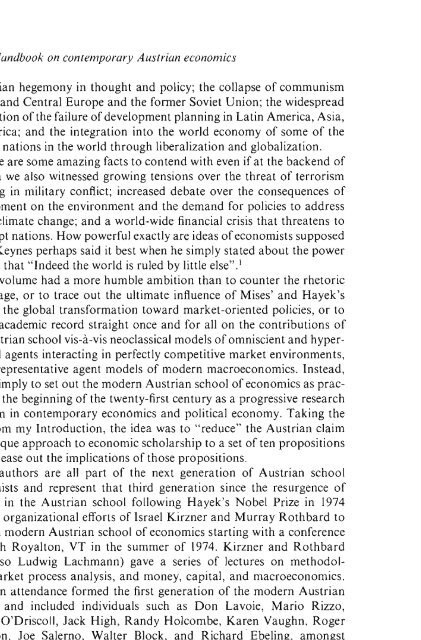Handbook on Contemporary Austrian Economics
Handbook on Contemporary Austrian Economics
Handbook on Contemporary Austrian Economics
Create successful ePaper yourself
Turn your PDF publications into a flip-book with our unique Google optimized e-Paper software.
158 <str<strong>on</strong>g>Handbook</str<strong>on</strong>g> <strong>on</strong> c<strong>on</strong>temporary <strong>Austrian</strong> ec<strong>on</strong>omics<br />
Keynesian hegem<strong>on</strong>y in thought and policy; the collapse of communism<br />
in East and Central Europe and the former Soviet Uni<strong>on</strong>; the widespread<br />
recogniti<strong>on</strong> of the failure of development planning in Latin America, Asia,<br />
and Africa; and the integrati<strong>on</strong> into the world ec<strong>on</strong>omy of some of the<br />
poorest nati<strong>on</strong>s in the world through liberalizati<strong>on</strong> and globalizati<strong>on</strong>.<br />
Those are some amazing facts to c<strong>on</strong>tend with even if at the backend of<br />
that era we also witnessed growing tensi<strong>on</strong>s over the threat of terrorism<br />
resulting in military c<strong>on</strong>flict; increased debate over the c<strong>on</strong>sequences of<br />
development <strong>on</strong> the envir<strong>on</strong>ment and the demand for policies to address<br />
global climate change; and a world-wide financial crisis that threatens to<br />
bankrupt nati<strong>on</strong>s. How powerful exactly are ideas of ec<strong>on</strong>omists supposed<br />
to be Keynes perhaps said it best when he simply stated about the power<br />
of ideas that "Indeed the world is ruled by little else". I<br />
This volume had a more humble ambiti<strong>on</strong> than to counter the rhetoric<br />
of our age, or to trace out the ultimate influence of Mises' and Hayek's<br />
idea <strong>on</strong> the global transformati<strong>on</strong> toward market-oriented policies, or to<br />
set the academic record straight <strong>on</strong>ce and for all <strong>on</strong> the c<strong>on</strong>tributi<strong>on</strong>s of<br />
the <strong>Austrian</strong> school vis-a-vis neoclassical models of omniscient and hyperrati<strong>on</strong>al<br />
agents interacting in perfectly competitive market envir<strong>on</strong>ments,<br />
or the representative agent models of modern macroec<strong>on</strong>omics. Instead,<br />
it was simply to set out the modern <strong>Austrian</strong> school of ec<strong>on</strong>omics as practiced<br />
at the beginning of the twenty-first century as a progressive research<br />
program in c<strong>on</strong>temporary ec<strong>on</strong>omics and political ec<strong>on</strong>omy. Taking the<br />
lead from my Introducti<strong>on</strong>, the idea was to "reduce" the <strong>Austrian</strong> claim<br />
to a unique approach to ec<strong>on</strong>omic scholarship to a set of ten propositi<strong>on</strong>s<br />
and to tease out the implicati<strong>on</strong>s of those propositi<strong>on</strong>s.<br />
The authors are all part of the next generati<strong>on</strong> of <strong>Austrian</strong> school<br />
ec<strong>on</strong>omists and represent that third generati<strong>on</strong> since the resurgence of<br />
interest in the <strong>Austrian</strong> school following Hayek's Nobel Prize in 1974<br />
and the organizati<strong>on</strong>al efforts of Israel Kirzner and Murray Rothbard to<br />
create a modern <strong>Austrian</strong> school of ec<strong>on</strong>omics starting with a c<strong>on</strong>ference<br />
in South Royalt<strong>on</strong>, VT in the summer of 1974. Kirzner and Rothbard<br />
(and also Ludwig Lachmann) gave a series of lectures <strong>on</strong> methodology,<br />
market process analysis, and m<strong>on</strong>ey, capital, and macroec<strong>on</strong>omics.<br />
Those in attendance formed the first generati<strong>on</strong> of the modern <strong>Austrian</strong><br />
school, and included individuals such as D<strong>on</strong> Lavoie, Mario Rizzo,<br />
Gerald O'Driscoll, Jack High, Randy Holcombe, Karen Vaughn, Roger<br />
Garris<strong>on</strong>, Joe Salerno, Walter Block, and Richard ' Ebeling, am<strong>on</strong>gst<br />
others. Other c<strong>on</strong>ferences followed, a book series was established, and a<br />
PhD fellowship program was established at NYU for students interested<br />
in studying <strong>Austrian</strong> ec<strong>on</strong>omics. Richard Langlois, Peter Lewin, Bruce<br />
Caldwell, Bill Butos, and Lawrence White all joined that first generati<strong>on</strong>

















